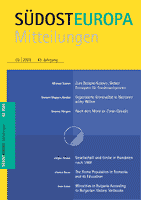Zum hundertsten Geburtstag von Hermann Gross (1903-2002). Wirtschaftswissenschaftliche Südosteuropa-Forschung im Wandel der Zeiten
To the Occasion of the 100th Birthday of Hermann Gross (1903-2002). Applied Southeast -Europe Economics in the Course of Time
Author(s): Roland SchönfeldSubject(s): History
Published by: Südosteuropa Gesellschaft e.V.
Summary/Abstract: Systematic research on the economic development of Southeastern Europe started only after the building of nations and the foundation of states in the region in the 19th century. Their efforts to modernize their backward economies were supported by European powers. The interest of the German industry to tap the resources of the region prompted economic research in Germany. Even before the First World War, Leipzig had become a centre of studies of Balkan languages, literature, geography and history. Its university was a preferred destination for students from Southeastern Europe. Hermann Gross, born in Kronstadt, Transylvania, in 1903, went to Leipzig in 1921, graduated in economics and became a research assistant first in Kiel, then again at the University of Leipzig. His teacher, Professor Wiedenfeld, encouraged him to organize an Institute for Central and Southeast European Economic Research and a specialized research library at the Department of Economics, attracting many students and scholars also from Southeastern Europe. Gross received his doctorate and wrote a postdoctoral thesis to qualify as a university lecturer that was published in 1937 as “Southeastern Europe. Structure and Development of the Economy”. German industrial associations searched his advice. In 1939, the I.G. Farben AG engaged him as the Director of their Viennese branch of the Economics Department. After the Second World War, Gross returned to Kiel as a Department Head of the Institute for World Economy and a Professor at the University of Kiel. In 1952, he was among the founders of the Southeast Europe Association and had served as its Vice President for almost four decades. In 1962, he was appointed to the Chair of Economics and Society of Southeastern Europe at Munich University, where he was a respected and popular teacher till he reached emeritus status in 1970. He lived long enough to see the state-imposed decline of economic research on Southeastern Europe in the nineties, at a time when the European Union was opening its gates to more and more countries of the region.
Journal: Südosteuropa Mitteilungen
- Issue Year: 2003
- Issue No: 01
- Page Range: 58-70
- Page Count: 13
- Language: German
- Content File-PDF

